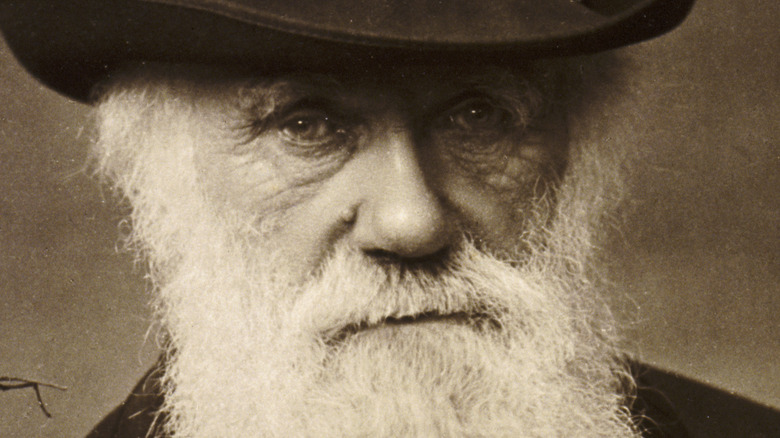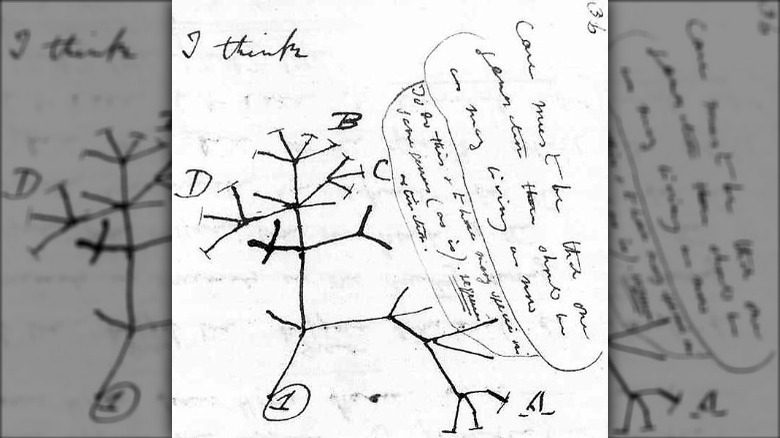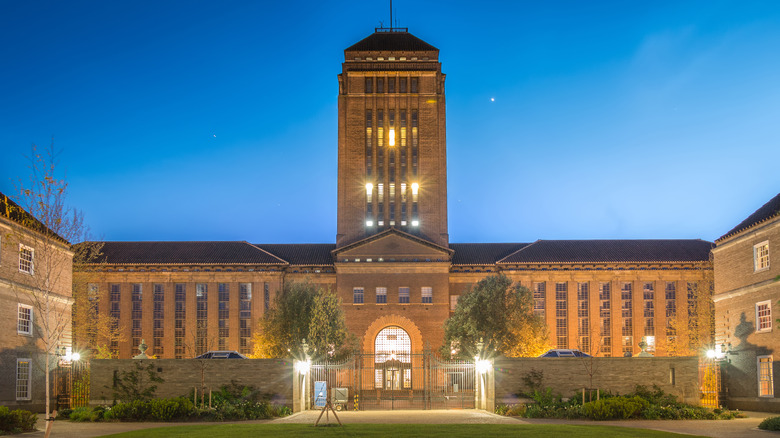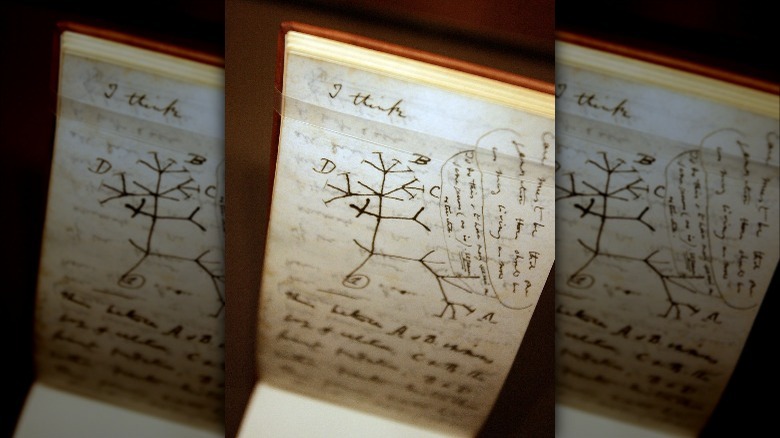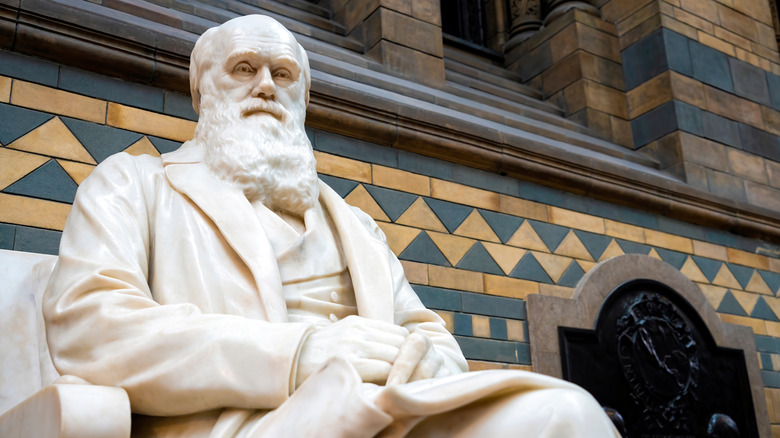The Mystery Of Charles Darwin's Stolen Notebooks
There have been some bizarre crimes committed against historical artifacts in the U.K. over the years. Per The New York Times, in 1987, Robert Cambridge entered the National Gallery in London with a shotgun and fired at "The Virgin and Child with St. Anne and St. John the Baptist," a priceless sketch by Renaissance master Leonardo da Vinci. (It had previously been attacked with ink in 1962.) In 2014, thieves broke into London's Golders Green Crematorium and attempted to steal an urn containing the ashes of the founder of psychoanalysis Sigmund Freud. And n 2009, it was reported that an Iranian academic had been jailed after causing hundreds of thousands of dollars of damage by using a scalpel to remove selected pages from valuable 16th-century books held at the British Library.
So it was perhaps no surprise when in 2020, alarm bells rang regarding a conspicuous absence in the archives of Cambridge University library may have been the result of foul play. The objects in question were simply two otherwise anonymous-looking notebooks, which had been held at the library for more than 100 years. But what made these notebooks special was their author: Charles Darwin, the British scientist venerated today as the father of modern evolutionary theory.
Darwin's 'Tree of Life' notebooks
Though never published, the notebooks in question are important documents that cast light on how Darwin came to his earth-shattering conclusions regarding how life on Earth came to be, and are of great value to Darwin scholars and researchers who want to trace the development of his evolutionary thought.
Per CBS News, the volumes have become known as the "Tree of Life" notebooks, thanks to a famous sketch one of them contains which uses the metaphor of the tree of life to demonstrate how animal characteristics are passed through the generations. Darwin filled the notebooks in the years following his famous journey from the British Isles to South America on the HMS Beagle (via the University of Cambridge). It was on this journey, beginning in December 1831, that Darwin began the research that culminated in the publication of his landmark work, "On the Origin of Species," in 1859 (via The American Museum of Natural History)
According to the director of Cambridge University Libraries, Dr. Jessica Gardner, the otherwise humble notebooks were each barely the size of a paperback novel. As objects of historical importance, however, they could be assumed to be worth many millions of dollars.
Alarm bells
According to the University of Cambridge, Charles Darwin's "Tree of Life" notebooks had long been kept in their Special Collection Strong Rooms, a specially-maintained facility housing the library's most important archival objects. In September 2000, the notebooks were removed from the Strong Rooms so that the archive could be photographed, at which time they mysteriously disappeared. The loss was first discovered the following January, during an inventory check which revealed the box usually containing the two volumes was not in its rightful place. The librarians searched of the building, but with the total shelf space of Cambridge University Libraries measuring some 130 miles, librarians believed that the notebooks had been unfortunately lost somewhere among the holdings, which at the title totaled more than 10 million books and historical objects.
Dr. Gardner said in 2020: "Security policy was different 20 years ago. Today any such significant missing object would be reported as a potential theft immediately and a widespread search begun." After Gardner joined the library in 2017, she instigated a full "fingertip examination" of the Darwin archive, before directing a painstaking search of the whole library in search of the lost notebooks. It would be nearly two decades after the notebooks first went missing that the University of Cambridge announced that they were certain the priceless works were not anywhere in the library's archives.
Fears of theft
With the University of Cambridge librarians now certain that Darwin's "Tree of Life'" notebooks were nowhere to be found among their holdings, they came to the unfortunate conclusion that the notebooks had been stolen. In 2020, the library launched the Darwin Appeal, a campaign to return the missing notebooks and to ask members of the public to come forward with any information they might have regarding the notebooks' whereabouts. At the time, it was feared that the artifacts may have been sold to a buyer through the black market.
The scale of rare book theft in the U.K. was highlighted back in 2017, when reports emerged that a criminal gang operating out of Romania had finally been jailed after organizing the burglary of numerous libraries to steal priceless historical works by Isaac Newton, Galileo, and Dante, as well as sketches by the Spanish Renaissance artist Francisco de Goya (via DW). A statement from Cambridgeshire Police read: "We have made initial inquiries to trace their whereabouts, including contacting Interpol to place the items on their Stolen Works of Arts Register" (via the Darwin Appeal).
How were the books returned?
However, more than two decades after Charles Darwin's 'Tree of Life' notebooks disappeared from the Cambridge University Libraries archive, librarians who had been searching for years for the missing artifacts made a mysterious and unexpected discovery.
On March 9, librarians discovered a pink gift bag, conspicuously placed in a public area outside an office on the fourth floor of the building, a location believed to have been chosen due to a lack of security cameras. Inside — shockingly — were two notebooks, wrapped in plastic, bearing all the hallmarks of the missing Darwin works, according to The Guardian. Also enclosed in the gift bag was a computer-printed note, which read simply:
"Librarian
Happy Easter
X"
On April 5, 2002, it was announced that the notebooks had been verified as real. According to AP News, the two notebooks had also been examined by experts and appeared to have been returned to the library entirely undamaged.
Scholars' 'joyous' reaction
The return of Charles Darwin's missing notebooks made headlines around the world on the morning of April 5, with scholars taking to the airwaves to express their relief that the documents had finally been recovered.
Cambridge University Libraries director Dr. Jessica Gardner said that her feelings upon the return of the priceless notebooks were of "immense" joy, adding: "My sense of relief at the notebooks' safe return is profound and almost impossible to adequately express ... I, along with so many others, all across the world, was heartbroken to learn of their loss," per The Guardian. "The notebooks can now retake their rightful place alongside the rest of the Darwin Archive at Cambridge, at the heart of the nation's cultural and scientific heritage, alongside the archives of Sir Isaac Newton and Professor Stephen Hawking."
Cambridgeshire Police have issued a statement saying that their investigation into how the notebooks went missing is still ongoing and that they are pursuing "lines of inquiry" to bring those responsible to account, according to AP News. They continue to ask members for the public for any information as to how the notebooks were taken, or who took it upon themselves after two decades of searching.
